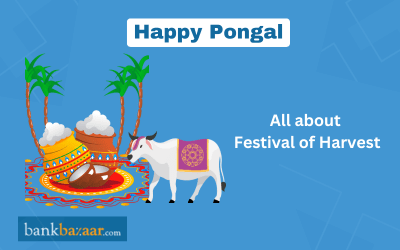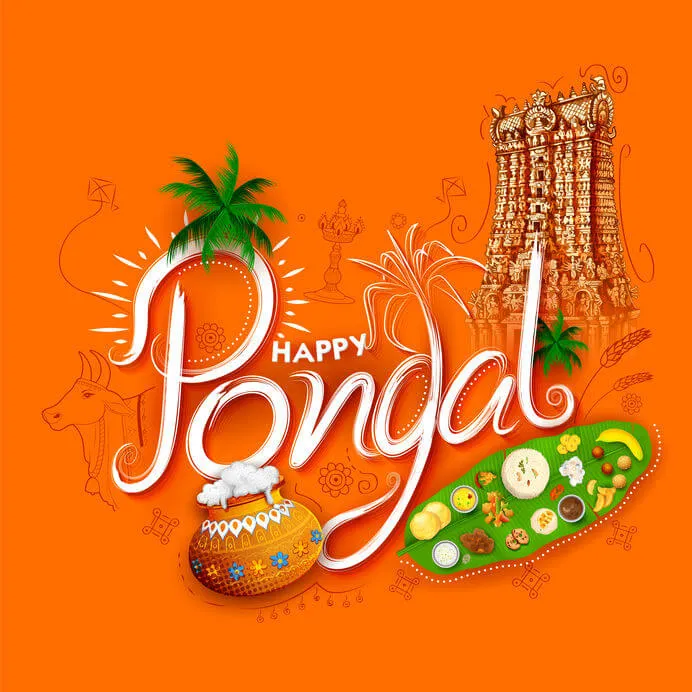Pongal 2026
Table of Contents
Pongal is a four-day long harvest festival celebrated mostly in the states of South India, especially in Tamil Nadu. It's celebrated in the winters when the sun reaches at the extremes of the southern hemisphere and starts returning to the northern hemisphere (as per Hindu calendar). Pongal will begin on the 14th of January.
Pongal Holidays in 2026
Name of the festival | Date | Day |
13 January 2026 | Tuesday | |
14 January 2026 | Wednesday | |
Surya Pongal | 14 January 2026 | Wednesday |
Mattu Pongal | 16 January 2026 | Friday |
Kaanum Pongal | 17 January 2026 | Saturday |
Festival Names in Different States
Name | Region |
Makar Sankranti | Uttar Pradesh, Karnataka, Goa, Andhra Pradesh, Kerala, West Bengal, Maharashtra, Bihar, Telangana, Madhya Pradesh, Manipur, Odisha , Kerala |
Uttarayana | Rajasthan, Gujarat |
Maghi | Punjab, Haryana, Himachal Pradesh |
Magh Bihu | Assam |
Maghe Sankranti | Nepal |
How Pongal is Celebrated

The following are the details of how Pongal is celebrated:
The word "Pongal" is associated with rice and means "to boil". The day is generally celebrated as a gesture of appreciation toward the Sun God for successful harvest. It is for this reason that people boil rice in milk and offer it to the sun before the commencement of the festival.
Since it's a four-day festival, each day has its own significance. The following are the four significant days of Pongal:
Bhogi Pongal: The first day is called the Bhogi festival and is observed to honour Lord Indra. A popular custom on this day is to burn all the useless items in a household by throwing them in a bonfire made of wood, cakes, and cow dung. 'Kolams' made of rice flour paste and red mud are used to decorate cleaned houses along with cow dung cakes and pumpkin flowers.
Surya Pongal: The second day of the festival is known as Thai Pongal, Surya Pongal, or Makar Sankranti in some other parts of the country. 'Pongal' made of rice and lentils boiled in milk and jaggery are prepared and offered to the Sun God on this day. People also decorate their house entrances with Kolam. It's usually done early in the morning after taking a bath.
Mattu Pongal: The third day is celebrated as Mattu Pongal where people indulge in worshipping cows. As per the myth, Lord Shiva sent his bull—Basava to earth to send across the message that Shiva wants the mortals to take oil massage and bath daily and eat once a month. Basava got confused and conveyed just the opposite massage. Shiva, as punishment, asked Basava to return to the earth forever and help people produce more food by ploughing the fields. On this day cows and oxen are given a bath, decorated with ornaments and flowers, worshiped and offered with Pongal. Bull fights are organised as a part of the festival.
Kaanum Pongal: The fourth and the final day is celebrated as Kaanum Pongal or Kanya Pongal. On this day, the leftovers (food) are placed on a washed turmeric leaf along with sugarcane and betel leaves. The women then perform a ritual praying for the prosperity of their brothers.
A huge festival down south, Pongal is also known for its special traditional dishes. Witness this festival if you are in South India in the month of January.
Pongal 2026 in India
Here are the details of Pongal festival in India in 2026:

Pongal is a popular Hindu festival celebrated in all parts of the country by different names. Tamil Nadu, a south Indian state, is famous for celebrating the festival of Pongal that lasts for 4 days. The festival is usually observed in the month of January every year. It brings happiness to the people being the first festival of the Gregorian calendar. Pongal is primary a thanksgiving to the Sun God for harvest.
Pongal denotes the beginning of the sun's six-month long voyage northwards. This also relates to the Indic solstice when the sun professedly arrives the 10th house of the Indian zodiac Makara. The festival is fundamentally celebrated to express appreciation to the Sun God for an efficacious harvest. The origins of the festival of Pongal might date to more than 1,000 years ago. A portion of the celebration is the sweltering of the first rice of the season. Pongal is also the name of a sweetened dish of rice boiled with lentils, which is prescriptively consumed on the festival day.
Public Life During Pongal Holidays
The following are the details regarding the public life during Pongal holidays:
- Pongal is a religious holiday in central and south India for employees, but is not a gazetted holiday in India.
- Colleges and schools in these regions remain closed for all fours of the festival.
- Businesses related to agriculture may remain closed.
- Pongal has various names, and the most common variations include Lohri, Makar Sankranti, Poki, Bihu and Hadaga.
- The festivity of Pongal varies slightly in celebration.
- The common symbols associated with the festival include the sun, the chariot, wheat grains and the sickle.
- Employees may make a restricted number of restricted holidays, but government offices and most businesses remain open.
Three Best Destinations to Visit During Pongal Holidays in 2026
The following are the top five destinations you can commute to witness the Pongal fervor in Tamil Nadu:
- Madurai: Madurai pageants the true essence of the festivities of Pongal with numerous fields and temples. Visiting the temples in the city of Madurai is a great experience during Pongal holidays despite the crowds.
- Tanjavur: Tanjavur is a special destination with decorated houses and kolams. A special event to look out for is the celebration of Brihadeeshwar Temple's Maatu Pongal.
- Pollachi: Pollachi is sited at a distance of 44 kilometers from the city of Coimbatore. It is the gateway to several scenic tourist places in the surrounding area.
List of Trading Holidays

FAQs on Pongal 2026
- What is the origin of the Pongal festival, and how old is its tradition?
The origins of the Pongal festival may date back more than 1,000 years. The festival's traditions include the ceremonial boiling of the first rice of the season as a symbol of thanksgiving to the Sun God for a bountiful harvest.
- How does the festival of Pongal vary in celebration across different regions of India?
While Pongal is a popular Hindu festival celebrated nationwide, it goes by various names in different regions, like Lohri, Makar Sankranti, Poki, Bihu, and Hadaga. The mode of celebration may vary slightly in traditions and rituals.
- What are the common symbols associated with the Pongal festival?
Common symbols associated with Pongal include the sun, the chariot, wheat grains, and the sickle, all representing elements of the harvest and agricultural prosperity.
- How is the festival Pongal traditionally celebrated over the four days?
The festival spans four days, with each day having its own significance: Bhogi Pongal, Surya Pongal, Mattu Pongal, and Kaanum Pongal.
- What happens during Bhogi Pongal?
Bhogi Pongal is the first day when people honour Lord Indra by burning useless household items in a bonfire. Homes are decorated with rice flour Kolams.
- What is the significance of Surya Pongal?
Surya Pongal, also known as Thai Pongal, involves preparing and offering 'Pongal' made of rice, lentils, milk, and jaggery to the Sun God.
- Why is Mattu Pongal celebrated, and what customs are associated with it?
Mattu Pongal is dedicated to worshipping cows, with the myth of Lord Shiva sending his bull to earth. Cows are bathed, decorated, and offered Pongal.
- What happens on the final day, Kaanum Pongal?
Kaanum Pongal involves placing leftover food on a turmeric leaf, along with betel leaves and sugarcane. Women perform a ritual praying for the prosperity of their brothers.
- How does public life change during the Pongal holidays?
Pongal is a religious holiday in central and south India, with colleges and schools closed. Businesses related to agriculture may also remain closed.
- Which are the three destinations to experience Pongal fervour in Tamil Nadu?
Madurai, Tanjavur, and Pollachi are the three top destinations to witness grand Pongal festivities in Tamil Nadu during the holidays.

Disclaimer
Credit Card:
Credit Score:
Personal Loan:
Home Loan:
Fixed Deposit:
Copyright © 2026 BankBazaar.com.